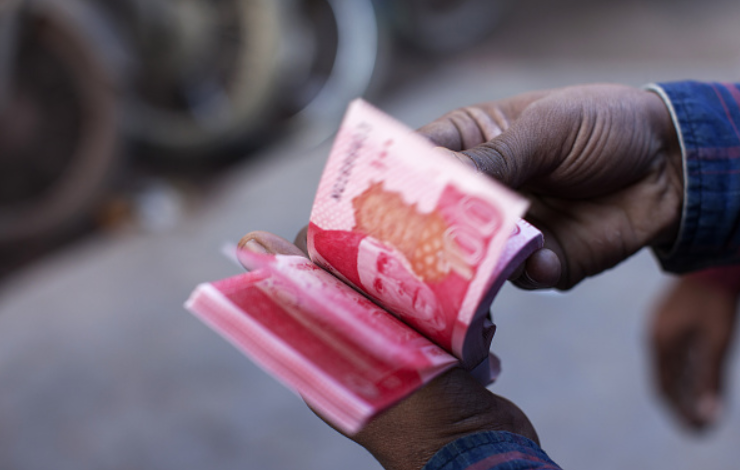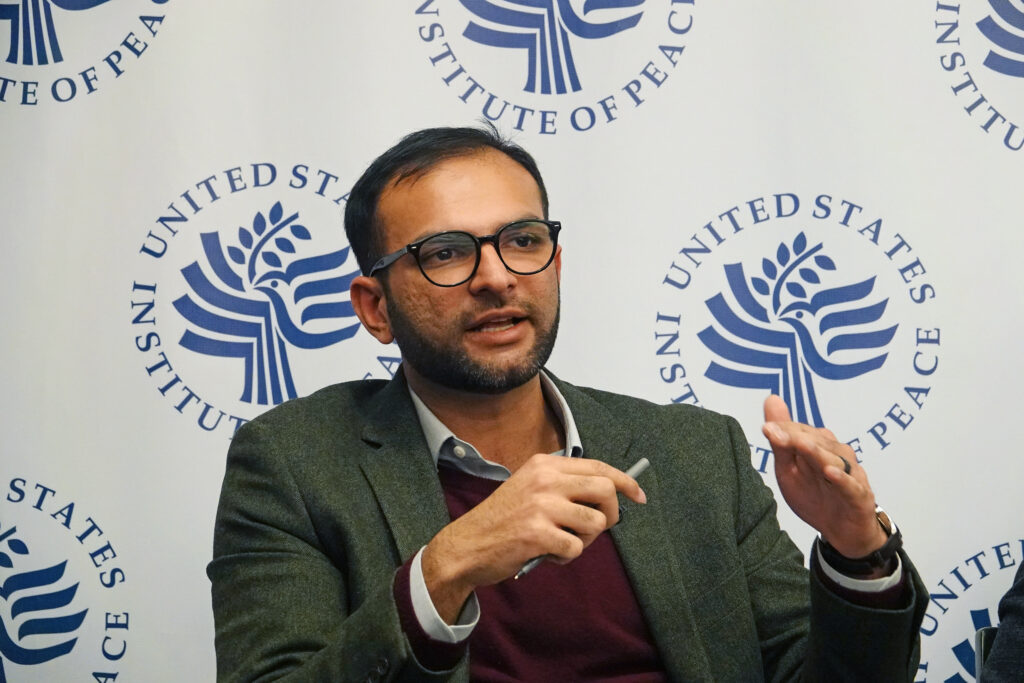
Over the summer, Pakistan’s economy has been in an increasingly precarious position as deeply rooted structural vulnerabilities collide with the ongoing reverberations of the COVID-19 pandemic and rising inflation. Meanwhile, the country continues to be embroiled in domestic polarization with former Prime Minister Imran Khan maintaining strong street power after his ouster via a Vote of No Confidence in April. To understand these evolving economic and political shifts, South Asian Voices invited Uzair Younus to discuss these trends with the SAV editorial team. In the conversation below we discuss the driving factors in Pakistan’s current economic crisis, how former Prime Minister Imran Khan’s recent charges under Pakistan’s anti-terrorism act and domestic unrest may impact the economy, the anticipated IMF bailout, and more.
Uzair Younus is the director of the Pakistan Initiative at the Atlantic Council’s South Asia Center. He is also manager for engagement and strategy at Dhamiri, an innovation firm helping companies align their business competencies with public good needs. Younus regularly publishes articles on South Asian politics and economic issues for Dawn, and has been featured on Bloomberg, CNN, and CNBC, and is the host of the Pakistonomy podcast. Read his interview with SAV on current economic and political developments in Pakistan below:
How would you map out the trends in Pakistan’s economy in the past two years – to what extent have global shocks like the pandemic and inflation contributed to where Pakistan’s economy is today?
The pandemic was a body blow to an economy that was already on its knees, leading to a recession for the second time in Pakistan’s history. The public health and economic response of then-Prime Minister Imran Khan’s government was commendable, and it protected the country from the negative fallout that we saw in India, for example.
However, the government missed the opportunity presented by this crisis to embark on painful reforms and began to ignore Pakistan’s own economic limitations. This meant that the structural vulnerabilities remained in place and, when global commodity prices began to rise, Pakistan’s economy fell off a cliff once again.
So, while global shocks have exacerbated the problems in Pakistan, the reality is that the country’s kleptocratic economy, which has not been reformed and restructured for over three decades, created the conditions for the perfect storm that has engulfed the country today.
To what extent are Pakistan’s economic troubles driving the political uncertainty we’re seeing on the national stage?
While the opposition PDM argued that they were seeking to oust Khan due to rising inflation and economic troubles, this was just rhetoric. In reality, the goal was to oust Khan in collusion with the military establishment because Khan, like other prime ministers before him, had overstepped the limits that are there for any civilian leader in the country.
The ongoing political uncertainty, in my view, is driving economic issues, as it is forcing political elites to make populist decisions at the risk of long-term economic stability. An example is the disastrous policy to subsidize petroleum consumption. This decision was made by Khan on his way out, perhaps to make his government more popular but also to lay a minefield for his successors. The Sharif government took weeks to reverse course, mainly because it was unsure of the political ramifications of this move.
The ongoing political uncertainty, in my view, is driving economic issues, as it is forcing political elites to make populist decisions at the risk of long-term economic stability.
As a result, the political chaos fed economic instability, worsening the economic outlook for Pakistan and bringing the economy closer to default.
This past weekend, former PM Imran Khan was charged under Pakistan’s anti-terrorism act, which seems to have bolstered his (already high) popularity. What might the consequences be for the current government and Pakistan’s immediate economic future?
Pursuing these outlandish cases against Khan is a repeat of the cycle where governments have tried to weaken their political opponents; Khan’s own government was guilty of similar tactics. In South Asian politics, citizens are drawn to leaders who they see as being persecuted for pursuing a higher cause. In Pakistan’s own history, Zulfiqar Ali Bhutto stands out in terms of what these tactics can do in terms of boosting the popularity of a political leader.
Pursuing these cases only shows that the government and its backers are not confident of denting Khan’s rise in a political contest, which is why they are relying on anti-terrorism cases. These measures will only add to instability and keep the country’s political economy off balance.
As Pakistan appears to move closer towards a potential IMF loan disbursement of 1.2 billion, along with loans from several Gulf countries, what impact do you see this having on the current economic situation in the short, medium, and long term?
In the near term, Pakistan’s economy is expected to stabilize as a result of these inflows. However, the medium and long-term outlook remains unchanged, primarily because the government has not taken any significant measures to reform the economy. In fact, it has backed down in terms of taxing under-taxed sectors like retail trade and real estate.

These issues are at the heart of the regular crises Pakistan’s economy faces; so long as these issues remain unaddressed, the country will routinely face external sector and balance of payments crises.
Are there any indications that needed structural reforms will be taken such that Pakistan won’t require such infusions of external support going forward? What would it take for this IMF package to be the last?
The short answer is no. This is a coalition government that will soon be heading into elections. In addition, Khan is not backing down, meaning that they have very limited political capital to expend on decisions that are costly in the near term but solve the long-term challenges facing the country. In addition, Pakistan’s political and non-political elite are the beneficiaries of the status quo kleptocracy, and so one must ask: why would the beneficiaries of the status ever take steps to fundamentally change the structure of the economy, especially when they would lose out in terms of influence, income, and power?
To get out of this cycle, Pakistan needs to fundamentally reorganize its economy, starting with basic steps to secure life, property, and contracts. These are mostly political, not economic problems. On the economic side, the starting point has to be tax policy. It is unacceptable for a country like Pakistan to not tax agricultural income, ignore informal trade, leave real estate untaxed, and continue placing regressive indirect taxes in addition to increased taxes on salaried individuals and formal manufacturing businesses.
This policy skews the entire economy, directing capital towards unproductive sectors that do not increase the total productive capacity of the economy. As a result, the country does not end up making products that the rest of the world wants to buy, while the income earned by these untaxed sectors leads to increased demand for imports.
How are Pakistan’s political and economic decision-makers viewing the economic turmoil in Sri Lanka and slow-down in Bangladesh? Are there concerns Pakistan is next?
There was a short period where many inside and outside Pakistan, including myself, feared a Sri Lanka-like outcome. I still maintain that the ingredients for economic collapse are still there; perhaps Pakistan is too big to fail, which is why it keeps getting bailed out. Elites in Pakistan also subscribe to this view, resulting in them making poor choices that bring them to the doors of the IMF and friendly countries for bailouts.
To get out of this cycle, Pakistan needs to fundamentally reorganize its economy, starting with basic steps to secure life, property, and contracts. These are mostly political, not economic problems.
There is, however, a growing recognition that the status quo cannot hold for too long. The current finance minister has said this publicly on several occasions. Unfortunately, people like him and others who are more reform-oriented do not have a broad constituency. This is why we constantly hear that Miftah Ismal may soon be on his way out, as there are efforts from within his own party to oust him.
So long as elites don’t fully internalize that the status quo cannot hold, the ongoing crisis in Pakistan, whose economy has experienced secular stagnation for almost 30 years, will continue.
***
Click here to read this article in Urdu.
Image 1: Asim Hafeez/Bloomberg via Getty Images
Image 2: U.S. Institute of Peace via Flickr


